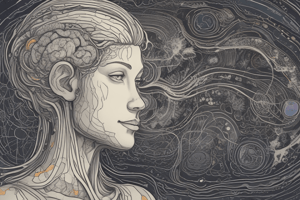Podcast
Questions and Answers
What is a fundamental characteristic that distinguishes humans from other species?
What is a fundamental characteristic that distinguishes humans from other species?
- Lack of social structures
- Inability to use tools
- Simplistic language use
- Advanced cognitive abilities (correct)
Which of the following best describes the term 'culture' in the context of human society?
Which of the following best describes the term 'culture' in the context of human society?
- Genetic inheritance patterns
- Shared knowledge and customs (correct)
- Physical characteristics of a population
- Psychological stages of development
What is one major hypothesis about the origin of modern humans?
What is one major hypothesis about the origin of modern humans?
- The independent evolution in isolation
- The Out of Africa theory (correct)
- The evolution from reptiles
- The descent from amphibians
Which system in humans is responsible for coordinating bodily functions?
Which system in humans is responsible for coordinating bodily functions?
Which of the following is NOT a complex emotion that influences human behavior?
Which of the following is NOT a complex emotion that influences human behavior?
How has globalization primarily affected human societies?
How has globalization primarily affected human societies?
What aspect of human behavior does moral philosophy primarily concern?
What aspect of human behavior does moral philosophy primarily concern?
Which of the following describes a significant impact humans have on the environment?
Which of the following describes a significant impact humans have on the environment?
Flashcards are hidden until you start studying
Study Notes
General Definition
- Human: A member of the species Homo sapiens, characterized by advanced cognitive abilities, social structures, and the use of complex language.
Biological Characteristics
- Anatomy: Bipedal primates with a highly developed brain.
- Genetics: Humans have 23 pairs of chromosomes; genetic variation is essential for evolution.
- Physiology: Complex systems (nervous, circulatory, respiratory) enable various functions.
Cognitive Abilities
- Intelligence: Advanced problem-solving, reasoning, and planning capabilities.
- Language: Unique ability to develop and use complex languages for communication.
- Creativity: Ability to create art, music, and literature, reflecting diverse cultures.
Social Structure
- Groups: Humans typically live in social groups, forming families, communities, and larger societies.
- Culture: Knowledge, beliefs, arts, laws, customs, and habits shared by a group.
- Economics: Varied systems of production, distribution, and consumption of goods.
Evolution
- Origin: Evolved from primate ancestors over millions of years, with significant milestones such as bipedalism and the use of tools.
- Migration: Out of Africa theory suggests modern humans dispersed globally, adapting to various environments.
Psychological Aspects
- Emotions: Complex emotions like love, anger, and empathy influence human behavior.
- Development: Lifespan stages from infancy to old age, with distinct psychological changes in each stage.
Ethics and Morality
- Moral Philosophy: Concepts of right and wrong, influenced by cultural and societal norms.
- Human Rights: Fundamental rights believed to belong to every individual, emphasizing dignity and freedom.
Impact on Environment
- Domination: Humans significantly impact ecosystems through technology and resource exploitation.
- Conservation: Awareness of environmental issues and efforts to sustain biodiversity and natural habitats.
Technology and Innovation
- Advancements: Development of tools, machines, and digital technology reshaping lifestyles and societies.
- Globalization: Interconnectedness of economies and cultures through trade, communication, and migration.
Health and Medicine
- Public Health: Focus on disease prevention, health education, and healthcare access.
- Genetics: Advances in genetics are leading to personalized medicine and therapies for various conditions.
Future Considerations
- Ethics in Technology: Ongoing debates about AI, biotechnology, and their implications on humanity.
- Sustainability: Urgent need for practices that balance human needs with environmental preservation.
General Definition
- Humans belong to the species Homo sapiens, noted for exceptional cognitive capabilities and intricate social structures.
- They possess advanced language skills, enabling complex communication.
Biological Characteristics
- Anatomy: Humans are bipedal primates with a highly developed brain, allowing for advanced thinking.
- Genetics: With 23 pairs of chromosomes, genetic diversity is crucial for evolutionary processes.
- Physiology: Comprises intricate systems, including nervous, circulatory, and respiratory systems, facilitating numerous bodily functions.
Cognitive Abilities
- Intelligence: Humans exhibit sophisticated problem-solving, reasoning, and planning skills.
- Language: They have a distinctive capacity to create and utilize complex languages for effective communication.
- Creativity: The ability to produce art, music, and literature, reflecting a wide array of cultural perspectives.
Social Structure
- Groups: Humans naturally organize into social groups, including families and communities, leading to larger societal structures.
- Culture: Encompasses shared knowledge, beliefs, art, laws, customs, and practices intrinsic to a group.
- Economics: Involves diverse systems for the production, distribution, and consumption of goods.
Evolution
- Origin: Evolved from ancestral primates over millions of years, with key developments like bipedalism and tool-making.
- Migration: The Out of Africa theory proposes that modern humans migrated worldwide, adapting to various environmental contexts.
Psychological Aspects
- Emotions: A wide range of complex emotions, such as love, anger, and empathy, shape human actions and interactions.
- Development: Human lifespan includes several stages, from infancy to old age, each associated with specific psychological transformations.
Ethics and Morality
- Moral Philosophy: Understanding of right and wrong is often shaped by cultural and societal influences.
- Human Rights: Fundamental rights recognized as inherent to every person, highlighting the importance of dignity and freedom.
Impact on Environment
- Domination: Humans exert considerable influence on ecosystems, primarily through technological advancements and resource consumption.
- Conservation: Increasing awareness and initiatives aimed at addressing environmental challenges and preserving biodiversity.
Technology and Innovation
- Advancements: Technological progress, including tools and digital innovations, profoundly alters human lifestyles and societal structures.
- Globalization: The interconnectedness of global economies and cultures facilitated by trade, communication, and migration.
Health and Medicine
- Public Health: Focus on preventing diseases, promoting health education, and ensuring access to healthcare services.
- Genetics: Innovations in genetics are paving the way for personalized medical interventions and targeted therapies for health issues.
Future Considerations
- Ethics in Technology: Ongoing discussions regarding the implications of AI and biotechnology on human society.
- Sustainability: A pressing need for practices that reconcile human development with environmental conservation.
Studying That Suits You
Use AI to generate personalized quizzes and flashcards to suit your learning preferences.




